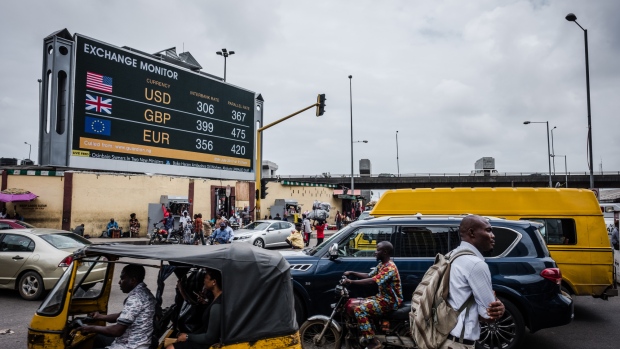Sep 18, 2019
Nigeria Says Its Targeted Forex Ban Is Needed for Food Security
, Bloomberg News

(Bloomberg) -- Nigeria’s decision to restrict access to foreign exchange for some food imports is aimed at giving the nation long-term control over its food supply as it prepares for potential interruptions due to climate events, water insecurity and global trade tensions, said Garba Shehu, spokesman for President Muhammadu Buhari.
Africa’s most populous nation needs to build up its domestic agricultural and food-manufacturing capacity because not doing so now would be “a recipe for instability and -- at worse --- widespread hunger,” Shehu said in an emailed response to questions. “Nigeria’s food security must come from within.”
While the government expects some price increases in the short term, it sees them rationalizing over time, he said. “In the long term, domestic production shall bring down prices.”
The food-price index in Africa’s largest oil producer has risen almost 80% since the start of 2015, pushing inflation above the central bank’s target and putting pressure on households’ finances in a country where about 60% of consumption spending goes to food. Domestic food-supply chains have been disrupted by a decade-long Islamist insurgency in the northeast region and clashes between nomadic herdsmen and sedentary farmers.
The planned inclusion of dairy products on the import-restriction list is intended to reduce those tensions while making local ranching viable, Shehu said.
“Only half of Nigeria’s 20 million cattle are used for dairy products, yet it is the largest milk importer in the region,” he said. He attributed the intensification of clashes between herdsmen and farmers to population growth, climate change and desertification.
The nation has also offered subsidized credit to drive farm mechanization and encourage development of the domestic manufacturing sector.
“These restrictions are temporary,” he said of the foreign-exchange measures. “They will last until our farmers and manufacturers, in what the government views as key and strategic industries, are competing on an even footing.”
To contact the reporter on this story: Anthony Osae-Brown in Lagos at aosaebrown2@bloomberg.net
To contact the editors responsible for this story: John McCorry at jmccorry@bloomberg.net, Benjamin Harvey, Rene Vollgraaff
©2019 Bloomberg L.P.


